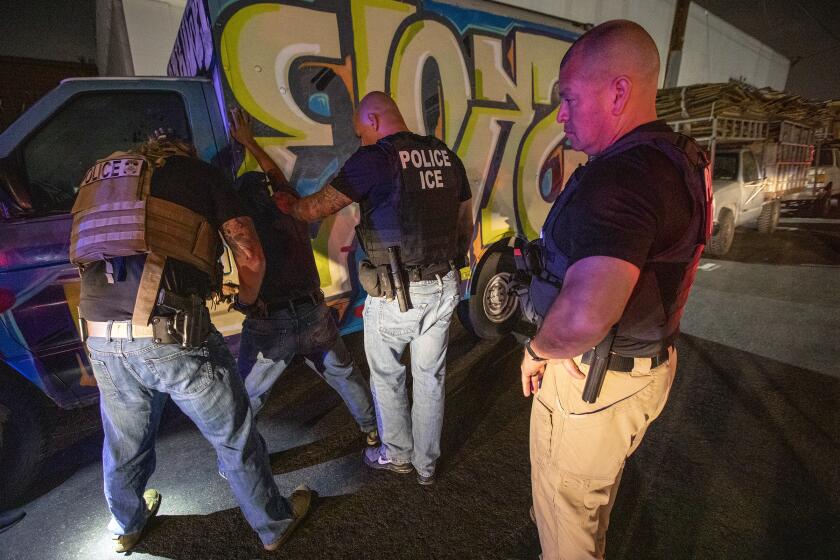Officials Feud Over Pace of Ballot Efforts to Reform the LAPD
- Share via
Los Angeles City Atty. James K. Hahn and several council members are feuding over how quickly the city should seek voter approval of a number of major police reform initiatives.
Hahn, who has proposed his own list of LAPD reforms, says the council needs to vote within the next two weeks to meet a deadline to place several proposed City Charter amendments on the June ballot, including a measure that calls for making the Police Commission president a full-time city employee.
Key council members, including Cindy Miscikowski, Mike Feuer and Joel Wachs, say they want further review of all proposed charter amendments before putting them on a ballot.
As a result, the city could be forced to either call for a special election on the police reform proposals later this year--at a cost of more than $1 million--or wait until the next citywide election, scheduled for March 2002.
Hahn, who is running for mayor, sent a terse letter to members of the council’s police reform committee last week, urging them to act quickly to address problems facing the Police Department, which is in the midst of a corruption scandal. “Failing to act on needed reform is detrimental to the goal we all share of achieving meaningful and long-lasting reform and is not in the best interest of the city,” Hahn said.
The council’s Ad Hoc Committee on Improvement to Police Policies and Practices was formed to make sure that Los Angeles finally follows through with a host of reforms, many of them outlined in a consent decree with the U.S. Department of Justice.
The committee was created in November, shortly after the council ratified the pact with the Justice Department. But the group did not meet until last week, and members concluded that they couldn’t meet the deadlines for the June ballot.
Feuer--who serves on the police reform committee with Wachs, Mark Ridley-Thomas and Nick Pacheco--said that while he is committed to overhauling the LAPD, the city should act deliberately, with input from the police union and the public.
“I want to be very clear,” Feuer said. “I’m a very strong proponent of moving rapidly with police reforms, but that doesn’t mean sacrificing oversight and input. And it can’t mean abandoning the ‘meet and confer’ process.”
Miscikowski agreed.
“This process has to be thoughtfully done,” said Miscikowski, who heads the committee. “I’m not feeling that we’ve got to respond to [Hahn’s] letter by having something on the ballot in two weeks.”
She said she believes that the council should aim to have a package of charter amendments before voters in March 2002, which would require the city lawmakers to act by November.
“That’s definitely a goal that we should be held to,” Miscikowski said.
Ridley-Thomas said the city should also explore the possibility of holding a special election, if it misses the deadline for the June ballot.
“The issue is not to make a quick decision,” he said. “The issue is to make a good decision--a decision that does not backfire on reform.”
He added: “If we are serious about reform, we should not delay.”
Hahn--who helped the city draft the consent decree--is seeking several charter amendments aimed at bolstering the Los Angeles Police Commission and overhauling the way the LAPD handles officer discipline and grievances.
His recommendations include:
* Replacing the LAPD’s disciplinary system with a civil-service model that would give officers the opportunity to have their grievances heard by a civilian panel.
* Prohibiting sworn LAPD personnel from serving as staff for the Police Commission and its inspector general.
* Transferring oversight of the department’s recruiting and hiring efforts from the city’s Personnel Department to the Police Commission.
Hahn said city officials realized while they were negotiating with the Justice Department that they needed to take “a hard look at the charter to see if it was standing in the way of achieving the full police reform.”
“We’ve got a good start with the consent decree,” he said. “But there are things we couldn’t get done because that would require changing the charter.”
Waiting another year to seek voter approval for the amendments “would be wrong,” said Hahn, whose office is also responsible for advising council members on ballot issues.
In addition to Hahn, USC professor Erwin Chemerinsky--who helped write the new City Charter two years ago--and members of the Police Commission’s Rampart Review Panel are calling for the council to quickly seek a variety of LAPD-related charter fixes.
“The charter changes that Hahn is talking about are crucial,” Chemerinsky said. “We need serious, substantial reforms. The sooner we take care of it, the better.”
More to Read
Sign up for Essential California
The most important California stories and recommendations in your inbox every morning.
You may occasionally receive promotional content from the Los Angeles Times.










